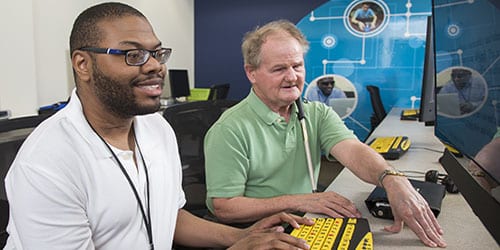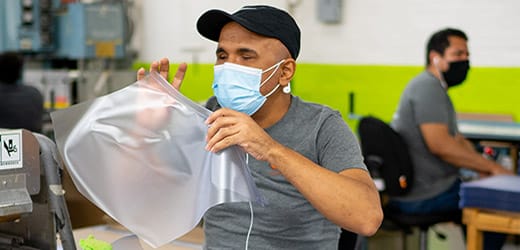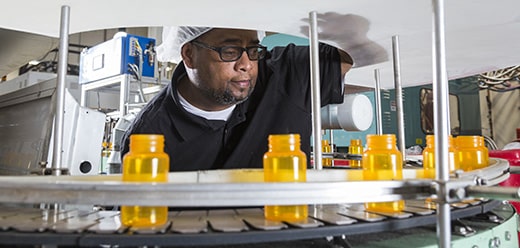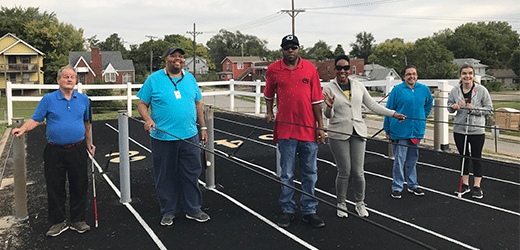Thousands of Students Later, Fettgather Prepares to Retire

How long have you had the same email address? A year? A few years? Maybe even close to a decade?
No matter how long, you’re behind Alphapointe Adaptive Technology Instructor Jim Fettgather. And, it’s probably not even close.
Fettgather started working at Alphapointe in 1995. Shortly thereafter, he received an email address. Nearly 30 years later – a period of time featuring an almost unimaginable amount of technological advancements – one thing remains the same: Fettgather’s email address.
And, the thousands of students Fettgather’s taught over the years are well aware.
“I’ve had this email address for so long,” he said. “I think people just know that I’ll still be here, so I still get emails from people I taught years and years ago. I’m always happy to help.”
One of the few constants in the ever-changing technological world during the past 30 years is finally coming to an end as Fettgather is retiring from Alphapointe.
When examined in the context of how technology has evolved, the past 30 years almost seem like the entire evolution of the age of dinosaurs – about 200 million years – compressed into a tiny sliver of time. One day, the history books very well may break up the existence of the human race into two time periods: pre-internet and post-internet.
Fettgather was on the front lines for that development – and so many more – during the past three decades. In fact, it’s how he landed at Alphapointe in the first place.
“The reason I got the job at Alphapointe was because I communicated with them via the internet,” he said. “Back then, very few people had access to the internet, so they were amazed that I got in touch that way and I think that helped me get the job.”
Prior to using his hands to manipulate all kinds of technological devices, Fettgather was an accomplished musician in the San Francisco/San Jose area. His affinity for music started early in his life by listening to top 40 radio. Fettgather, who was blind since birth, had an almost uncanny ability to listen to a piece of music and then be able to play it on a piano.
“I never had any lessons,” he said. “I just had that innate talent to listen to songs and then play them. I started playing in about seventh grade and I’ve been playing ever since.”
Fettgather spent the better part of the 1970s and early portion of the 1980s playing the club scene in the Bay Area.
“Places had house bands back then,” he said. “That doesn’t really exist anymore, but we would play at the same place for six nights a week for three or four years and then move onto another place for several years. There were a ton of clubs back then and they all had these types of house bands.”
But, in a precursor to where his new career took him, times changed.
“Playing clubs was not conducive to a family lifestyle,” Fettgather said with a chuckle.
So, he packed his belongings and ventured to Kansas City where he worked in the telecommunications industry. Then, California called once again.
“We moved back and started our own telephone answering service,” Fettgather said. “We started it from scratch. But, it was hard work. We worked 16-hour days and really gave it a valiant effort, but we eventually came back to Kansas City.”
Within a few years of working at Alphapointe, Fettgather became the organization’s adaptive technology instructor. When people need to know how to use an electronic device, Fettgather is the absolute go-to person. And, it’s always been that way – even when things were drastically different.
“When adaptive technology started, it was fairly unreliable,” Fettgather said. “Things would crash frequently and things weren’t very stable. There really weren’t many low vision options. They were expensive and hard to come by and there were very few features. There were really only a few ways to do things.
“Now, we take reading machines for granted because we can connect a $100 scanner to a computer and read anything we wish,” he said. “Or, we have a smartphone in our pocket that can do the same thing. In 1992, the ability to do that would cost $5,000 due to all the equipment. It was insanely expensive. And, to get anything done took a lengthy amount of time.”
That begs the question: in an era of unprecedented technological advancements, what is the most significant development?
Without hesitation, it’s an easy answer for Fettgather.
“No question – it’s the smartphone,” he said. “It’s allowed people to read books, read their email, handle job searches – it’s really allowed people to connect their lives to just about anything. You can dictate things so that you don’t need a keyboard. If you’re good at it, you can now create a professional document only using your voice. And, it fits in your pocket. It’s simply amazing.”
“Amazing” is a word that easily could be used to describe Fettgather’s career. In a journey filled with so many fulfilling moments as he helped people with low vision navigate themselves through the world, Fettgather’s favorite memory isn’t specific. Instead, it’s a collection of memories formed into a singular frequent occurrence.
“Everyone comes in with different skills and abilities,” he said. “Some people learn quickly, some people take a bit longer. What really stands out for me are the lightbulb moments. Things like a person sending their first email by themselves or when someone learns how to do a job search independently or when a person figures out how to order groceries online. Those types of things are the golden moments.”
No doubt – those golden moments have directly led to people with vision loss leading fulfilling lives and successfully gaining employment. And, that’s been a massive source of inspiration for Fettgather all these years.
“A lot of employers might say to themselves, ‘I can’t imagine how a visually impaired person could do this job, so they probably can’t do it,’” he said. “Well, guess what? There is a way for them to do the job. So many people don’t know about the adaptive technology available. I think they just don’t know about the possibilities. When they find out, it opens doors for people.”
As his career helping thousands of students by empowering them to learn how to use adaptive technology comes to a close, it does raise an important question. How will former students ask Fettgather their pressing questions now that his email address will change for the first time in decades?
“That’s a good question,” Fettgather said with a laugh. “If I were a betting man, I’d guess they’ll still track me down.”
A good bet, indeed.
Video of Jim playing the piano during his retirement party:
[embedyt] https://www.youtube.com/watch?v=nbDmsTQMm6E[/embedyt]





